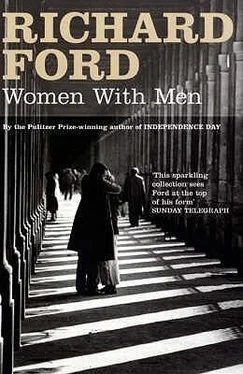Richard Ford - Women with Men
Здесь есть возможность читать онлайн «Richard Ford - Women with Men» весь текст электронной книги совершенно бесплатно (целиком полную версию без сокращений). В некоторых случаях можно слушать аудио, скачать через торрент в формате fb2 и присутствует краткое содержание. Год выпуска: 2006, Издательство: Bloomsbury Publishing PLC, Жанр: Современная проза, на английском языке. Описание произведения, (предисловие) а так же отзывы посетителей доступны на портале библиотеки ЛибКат.
- Название:Women with Men
- Автор:
- Издательство:Bloomsbury Publishing PLC
- Жанр:
- Год:2006
- ISBN:нет данных
- Рейтинг книги:3 / 5. Голосов: 1
-
Избранное:Добавить в избранное
- Отзывы:
-
Ваша оценка:
- 60
- 1
- 2
- 3
- 4
- 5
Women with Men: краткое содержание, описание и аннотация
Предлагаем к чтению аннотацию, описание, краткое содержание или предисловие (зависит от того, что написал сам автор книги «Women with Men»). Если вы не нашли необходимую информацию о книге — напишите в комментариях, мы постараемся отыскать её.
Women with Men — читать онлайн бесплатно полную книгу (весь текст) целиком
Ниже представлен текст книги, разбитый по страницам. Система сохранения места последней прочитанной страницы, позволяет с удобством читать онлайн бесплатно книгу «Women with Men», без необходимости каждый раз заново искать на чём Вы остановились. Поставьте закладку, и сможете в любой момент перейти на страницу, на которой закончили чтение.
Интервал:
Закладка:
Outside again, in the afternoon chill, Helen stared up at the great gold dome. She had her glasses off, her hand sheltering her eyes, as if from a sun, though one wasn't visible. Avenue de Breteuil lay behind her, cars and buses honking and letting off new crowds of tourists. “My single regret is my father isn't here with me. Or instead of me,” she said, gazing up. “He'd appreciate this so much.”
Matthews at that moment was thinking about his novel, his hands thrust in his trench-coat pockets. He was wondering whether he shouldn't just have called it a memoir and been done with it. He should, he felt. He didn't hear what Helen said, but sensed it was about being in the army in France and visiting this very spot not long after Hitler had been here.
“I know it meant a lot to him,” he said, looking all around. Again he had no idea what part of Paris he was in. Which arrondissement.
“You know what people want when they come to Paris?” Helen said, still staring up at the glowing dome, with the white sky in the background.
“I don't,” Matthews said. “I have no idea.”
“To be French.” Helen sniffed. “The French are more serious than we are. They care more. They have a perspective on importance and unimportance. You can't become them. You just have to be happy being yourself.”
Looking away, Matthews suddenly noticed the great colossus of the Eiffel Tower almost springing into the sky, more huge and grave but also so much prettier than he'd imagined it could be. None of the miniatures ever showed you how pretty and graceful it was. It was the most wonderful thing he had ever seen. Better than Niagara Falls. Only the Pyramids, he felt, were probably more wonderful. He was shocked by how happy he was to see it.
“That's right,” Matthews said, and he took Helen's cold, stiff hand, the one that held her glasses. He thought she'd been crying, and he wanted her to stop and be happy. “There's the Eiffel Tower,” he said brightly. “It was hidden, but now there it is.”
“Well, oh my,” Helen said, seeing it. “It sure is. There it is. I'm so happy to see it. I wondered if I would.”
“Me, too,” Matthews said. “I wasn't sure we would.”
“Aren't we lucky,” Helen said. “It's the miracle of the Occident.”
“I guess it is,” Matthews said. “I guess we are.”
And then they walked on.
THEIR WALK to the Eiffel Tower turned out to be longer than Helen had thought. This, she said — referring to the Fodor's — was because of a broad turn in the river Seine. “It's like New Orleans that way.” New Orleans, she said, was her favorite American city.
She announced that she was feeling better, due to the crisp air, and thought the day could go on the way she'd hoped — her “first day in Paris”: the stroll down the Champs Élysées, the visit to the famous execution site, the Louvre, the romantic boat ride, then the search for an incomparable meal.
Helen spoke much better French than Matthews expected and, because she felt better, went in several shops along the Avenue de la Bourdonnais and talked animatedly to the clerks, and to flower vendors and newsagents on the side streets leading toward the Champ-de-Mars. In all of this Matthews felt Helen became a kind of spectacle — the tall, pale, buxom blond American woman with thick glasses spouting out French to small aproned Frenchmen who looked up at her in annoyance, often before simply turning around and ignoring her. It was rude, but he didn't think he could blame them. They'd all seen Helens before, and nothing in life had changed.
Avenue de la Bourdonnais was a rich area, Matthews could see, with tall, elegant apartment buildings, big Jaguars and BMW wagons lining the wide, tree-lined boulevard, and many people talking on cell phones, standing in the middle of the sidewalk. Possibly this was the diplomatic sector, he thought. Possibly the American embassy itself was nearby, since there were a lot of Americans on the street, trying to act as if they spoke the language — his grad school French was too poor to even try. Though the French, he thought, seemed like they were acting too. They were like amateur actors playing French people but trying too hard. There was nothing natural to the whole enterprise.
Yet he found there was another, good side to it: since, when he would listen in on some conversation Helen was having with a clerk or a flower vendor and would try to figure out from this word or that what either one of them was saying, he got almost everything wrong. Listening this way, he made up whole parts and sometimes the entirety of conversations based on an erroneous interpretation of a hand gesture or a facial expression or some act of seemingly familiar body language coupled with a word he thought he knew but was usually also wrong about. It could get to be addictive, he believed, not understanding what people were saying. Time spent in another country would probably always be spent misunderstanding a great deal, which might in the end turn out to be a blessing and the only way you could ever feel normal.
In a tiny, unheated religious curio shop on rue Marinoni, Helen went rooting through bins of plastic crucifixes in several sizes and materials, then through framed color depictions of Christ in various aspects of dolor and beseechment, and finally through a stack of colored tea towels with religious mottoes stamped on them in several languages, like sweatshirts. Eventually she held one up, a pink one, that had the glory of god is to keep things hidden printed on it in white block letters.
“What's that mean?” Matthews said. “Is it a joke?”
“I'll give it to somebody back home for Christmas, somebody who lies to her husband.” She was staring down at her palm, trying to identify the right money to pay with. She seemed exhausted again. The young female Chinese clerk frowned at her. “It's a proverb,” Helen said, fingering through her coins. “It'll mean something different to anybody you give it to.” She smiled at him. “Do you love Paris now?” she said. “Do you feel like you're not the center of everything? Because you're certainly not.”
“I don't feel much like it's Christmas.”
“That's because you're not religious. Plus you're spoiled,” Helen said. “For spoiled people the real thing's never enough. Don't you know that?”
“I don't think I'm spoiled,” Matthews said.
“And spoiled people never do. But you are, though.” She said this sweetly, not to accuse him, just to acknowledge the truth everyone knew and needn't talk about. “Not to want to be the center of things, that's what spoiled people think they want,” she said. “I'm the same way. I'm just not as bad as you are. But it's all right. You can't help it. It's gotten you this far.” She smiled at him again and looked around the little shop, where a thousand colored likenesses of Christ gazed down on them in attitudes of compassion and acquiescence.
ON THE FIRST LEVEL of the Eiffel Tower, at 187 feet, Helen's stomach went immediately queasy and her knees unsteady, and she told Matthews she could feel the whole construction swaying and weaving in the “winds aloft” and that she'd never make it to level two, the 377-foot platform, much less to the top, where it was 899 and the view extended forty-two miles and Paris could be seen as it really was.
She ventured, however, over to the big banked window that looked north and, according to the colored map provided below the glass panorama, toward the Arc de Triomphe, the Champs Élysées and, farther on, though invisible beneath the low sky, toward the Sacré-Coeur church and Montmartre.
“Montmartre's where all the painters painted, including Picasso,” said Helen, focusing out over the great dun-colored grid of the city in winter. “I, of course, thought I'd never get to see it. And I don't feel like I can actually take it all in now. I can't, I guess.”
Читать дальшеИнтервал:
Закладка:
Похожие книги на «Women with Men»
Представляем Вашему вниманию похожие книги на «Women with Men» списком для выбора. Мы отобрали схожую по названию и смыслу литературу в надежде предоставить читателям больше вариантов отыскать новые, интересные, ещё непрочитанные произведения.
Обсуждение, отзывы о книге «Women with Men» и просто собственные мнения читателей. Оставьте ваши комментарии, напишите, что Вы думаете о произведении, его смысле или главных героях. Укажите что конкретно понравилось, а что нет, и почему Вы так считаете.












